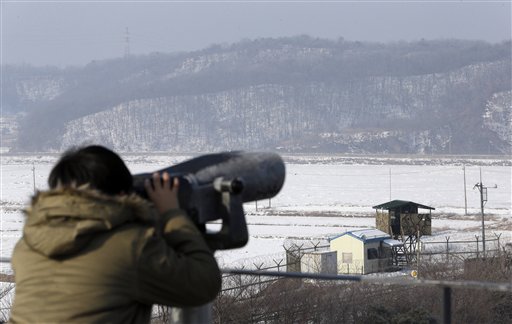PYONGYANG, North Korea — Defying U.N. warnings, North Korea on Tuesday conducted its third nuclear test in the remote, snowy northeast, taking a crucial step toward its goal of building a bomb small enough to be fitted on a missile capable of striking the United States.
North Korea said the atomic test was merely its “first response” to what it called U.S. threats, and said it will continue with unspecified “second and third measures of greater intensity” if Washington maintains its hostility.
The underground test, which set off powerful seismic waves, drew immediate condemnation from Washington, the U.N. and others. Even its only major ally, China, summoned the North’s ambassador for a dressing-down.
President Obama, who was scheduled to give a State of the Union address later Tuesday, said nuclear tests “do not make North Korea more secure.” Instead, North Korea has “increasingly isolated and impoverished its people through its ill-advised pursuit of weapons of mass destruction,” he said in a statement.
But the Obama administration’s options for a response are limited, and a U.S. military strike is highly unlikely.
In an emergency session, the U.N. Security Council unanimously said the test poses “a clear threat to international peace and security” and pledged further action.
U.S. Ambassador Susan Rice called the test “highly provocative” and said the North’s continued work on its nuclear and missile programs threatens regional and international peace and security and “the security of a number of countries including the United States.”
“They will not be tolerated,” she said, “and they will be met with North Korea’s increasing isolation and pressure under United Nations sanctions.”
It remains to be seen, however, whether China will sign on to any new, binding global sanctions. Beijing, Pyongyang’s primary trading partner, has resisted measures that would cut off North Korea’s economy completely.
China expressed firm opposition to Tuesday’s test but called for a calm response by all sides. Chinese Foreign Minister Yang Jiechi summoned North Korea’s ambassador and demanded that North Korea “swiftly return to the correct channel of dialogue and negotiation,” the ministry said in a statement.
North Korea will likely draw more sanctions at a time when it is trying to rebuild its moribund economy and expand its engagement with the outside world.
Send questions/comments to the editors.



Success. Please wait for the page to reload. If the page does not reload within 5 seconds, please refresh the page.
Enter your email and password to access comments.
Hi, to comment on stories you must . This profile is in addition to your subscription and website login.
Already have a commenting profile? .
Invalid username/password.
Please check your email to confirm and complete your registration.
Only subscribers are eligible to post comments. Please subscribe or login first for digital access. Here’s why.
Use the form below to reset your password. When you've submitted your account email, we will send an email with a reset code.